-
Miyagi Prefecture Sendai Daisan High School
- Level/s of EducationUpper SecondaryRegionHokkaido/Tohoku
- Main areas of activityBiodiversity, Oceans, Disaster reduction/prevention, Climate change, Energy, Environment, Cultural diversity, World heritage/intangible cultural heritage/regional cultural properties, International understanding, Human rights, Gender equality, Health, Dietary education, Poverty
| Location | 1-19, Tsurugaya, Miyagino-ku, Sendai-shi, Miyagi |
|---|---|
| TEL. | (+81)22-251-1246 |
| Website | https://sensan.myswan.ed.jp/ |
| Membership | 2022 |
2024 Annual Report
Biodiversity, Oceans, Disaster reduction/prevention, Climate change, Energy, Environment, World heritage/intangible cultural heritage/regional cultural properties, International understanding, Human rights, Sustainable production and consumption, Dietary education, Poverty, Biosphere reserves, Geoparks, Global Citizenship Education (GCED)
Our school aims to achieve the educational goals of “fostering a tolerant heart that collaborates with diverse people and a resilient and rich humanity that responds flexibly to societal changes,” “learning from the wisdom accumulated by humanity, refining intellect and sensitivity through the pursuit of truth, and cultivating an attitude of deep inquiry into phenomena,” and “contributing to the creation of a better future through nurturing a spirit of philanthropy and creative knowledge.” We strive to achieve these goals through the activities of the UNESCO School. Our school has developed its own educational program, aiming to cultivate the ability to proactively tackle various issues that the world faces, which are not easily solved, from both local and global perspectives, and to solve these issues in collaboration with diverse people.
(1)Initiatives for Achieving Sustainable Development and Lifestyles
To further develop the inquiry activities we have conducted so far, we have promoted learning from the perspective of ESD (Education for Sustainable Development) while utilizing local resources.
In the nearby school forest, we have created teaching materials in four areas: practical lessons in the natural sciences, inquiry activities and research projects, studies in the social sciences and humanities, and environmental education for local residents and students. In the subjects “Basic Biology” and the school-specific subject “SS Comprehensive Science” (a combined basic science subject), students observed vegetation (seasonal changes and differences due to growth environments) and identified plants using guidance from forestry research staff and tablet applications. In the school-specific subjects “Innovation Inquiry” and “Innovation Science Inquiry,” students examined the seasonal changes of plants, differences due to light levels, and soil properties, and conducted inquiry activities on sustainable forest resource utilization, including the maintenance and labor of the school forest, profits from selling cypress, and forestry issues. Additionally, the school forest was used for environmental education for nearby elementary and junior high school students, enhancing social contribution awareness and deepening learning through inter-age exchanges.
Furthermore, at the nearby Otsutsumi Pond, several groups interested in the park development from both natural and social science perspectives have taken on the “Otsutsumi Pond Park Development Plan” as their inquiry project. Since this park development cannot be resolved in a single year, several groups tackle it step by step each year, continuing their inquiry activities and aiming to collaborate with local governments while summarizing opinions from local residents.
Through these classes and extracurricular activities, students discover issues from their surrounding environment, examine them in detail, and present their findings, thereby fostering their ability to conduct advanced inquiries.
These activities have been shared nationwide and internationally through student presentations at the “G20 School-Community Collaboration Practice Virtual Exhibition” at the G20 Education Ministers’ Meeting and introductions at the 16th UNESCO School National Conference workshops.
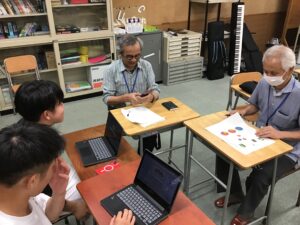
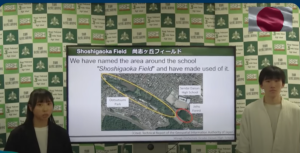
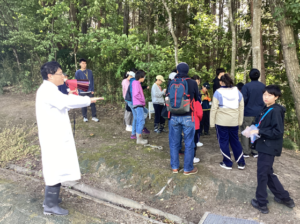
(2)Initiatives for Intercultural Learning and Respect for Cultural Diversity and Heritage
Continuing from last year, we participated in the “2024 Challenge Model United Nations in Yamagata,” where students acted as ambassadors of various countries, discussing global issues and seeking solutions while advocating for their assigned countries’ interests. We also incorporated Model United Nations activities into the “Public” class, allowing the entire grade to experience a series of Model United Nations activities and deepen their international understanding.
As part of our international exchange, in June, faculty and students from the College of Education at the University of Hawaii at Manoa visited, participating in classes and holding exchange meetings with our faculty and students. In August, students from Cheongryul Girls’ High School in South Korea visited, engaging in online exchanges beforehand and deepening international understanding while presenting each school’s initiatives. In October, students from Taichung Mingdao High School visited, participating in classes and exploring Sendai City, furthering their exchange.
Through Model United Nations activities, students cultivated attitudes aimed at contributing to the international community, negotiation skills to achieve their national interests, and cooperation skills to understand and debate with other countries. This proactive and dialogic program effectively enhanced educational outcomes. Building on these activities, we have heightened the significance of international exchange and provided opportunities to consider the construction of a sustainable society from a global perspective.
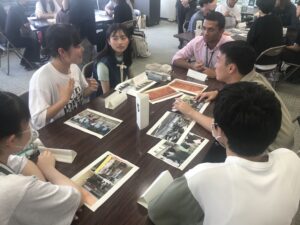
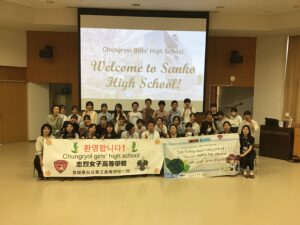
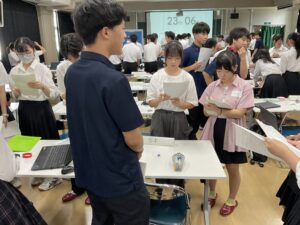
Annual Work Plan
April: Introduction to Innovation Inquiry, Innovation Inquiry I begins (1st and 2nd-year students)
- Learning skills for inquiry activities, discovering social issues, and promoting ESD (Education for Sustainable Development) towards solutions.
May: “Sanko Inquiry Day” (School Research Presentation) (2nd and 3rd-year students)
July: Model United Nations activities (1st and 2nd-year students)
July: ESD Lecture (1st-year students)
November: “Innovation Festa” (School Research Presentation) (2nd and 3rd-year students)
November: Participation in the 17th UNESCO School National Conference/ESD Research Conference (1st and 2nd-year students)
December: SSH-Class Creation Project Forum (School Research Presentation) (2nd-year students)
- Participation in the UNESCO School Hokkaido-Tohoku Conference (1st and 2nd-year students)
- Conducting mutual presentations with other schools during the school trip (2nd-year students)
March: Overseas Study Tour to Boston and Taichung
No related reports available in English.
